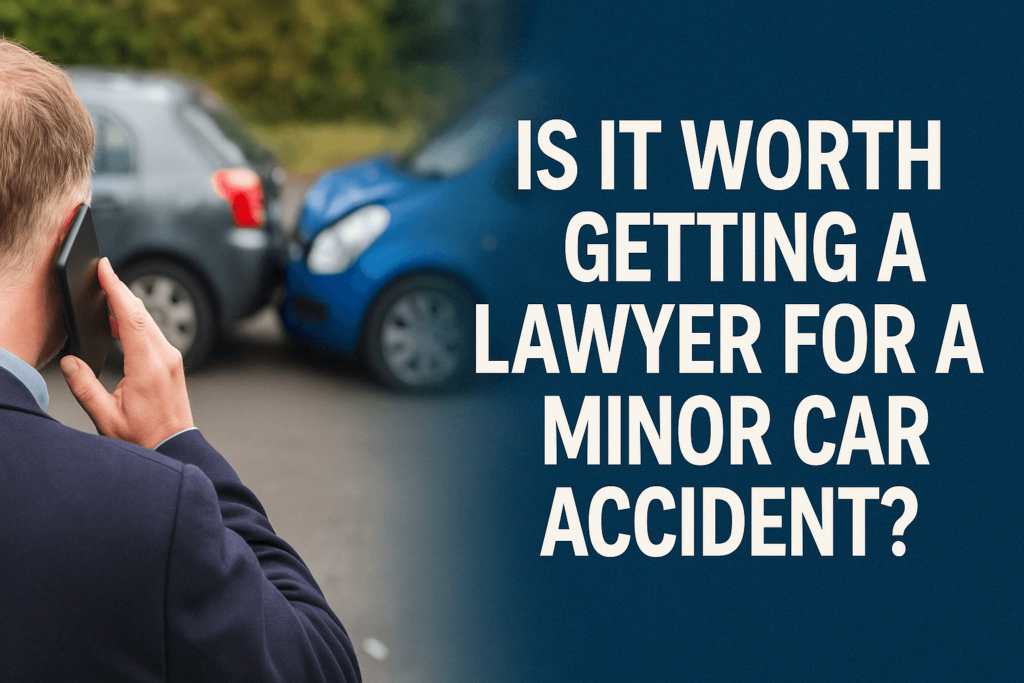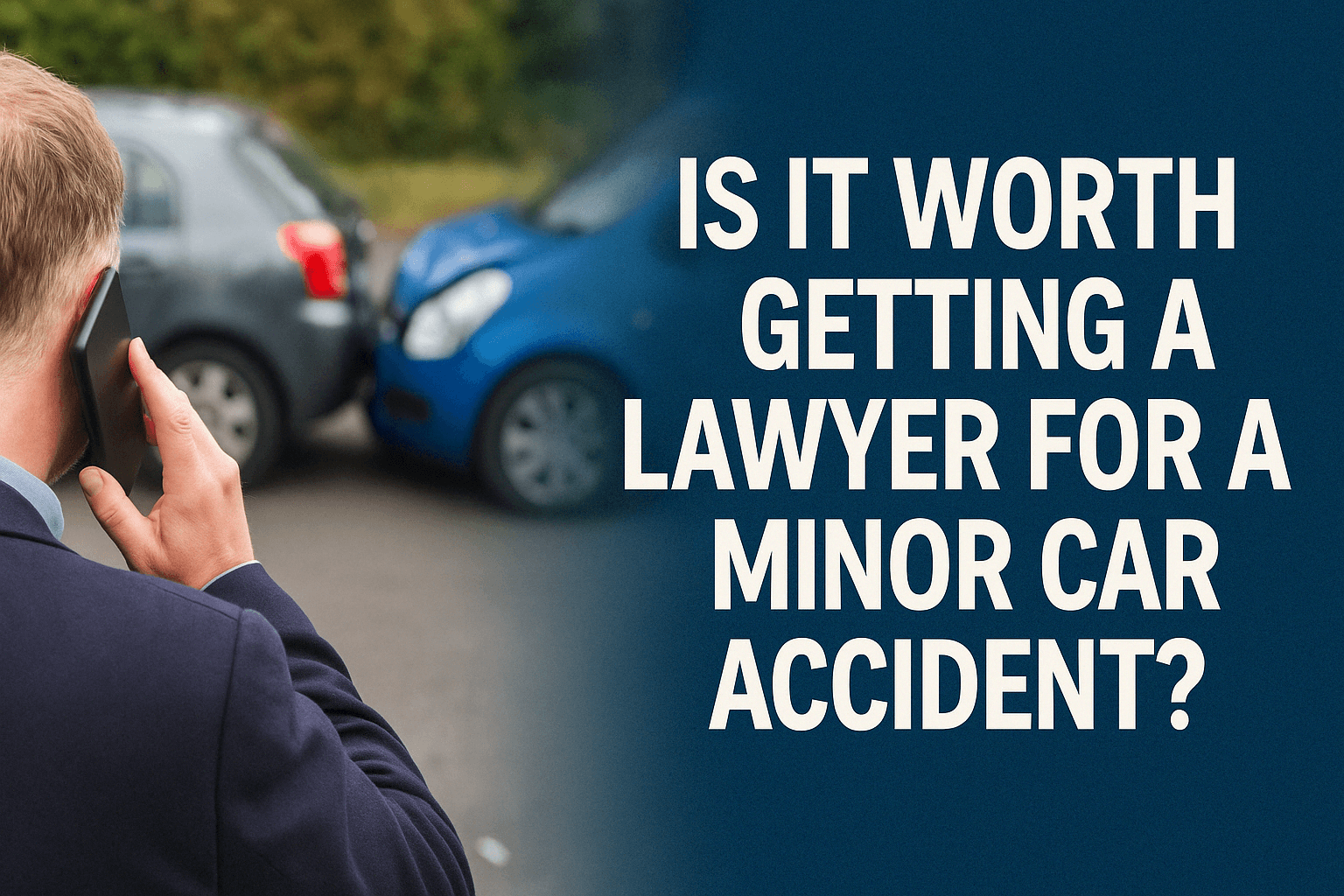Is It Worth Getting a Lawyer for a Minor Car Accident? What You Need to Know Before You Decide
In the realm of traffic collisions, the line between “minor” and “major” is often more psychological than factual. One moment, you’re rear-ended at 15 mph and shrug it off as an inconvenience. Weeks later, you’re waking up with a stiff neck and a claim that’s been quietly denied. In recent years, a growing number of drivers have found themselves navigating post-accident limbo—without legal guidance and without compensation.

The truth? Hiring a lawyer after a minor accident isn’t about launching lawsuits—it’s about protecting leverage in a system engineered to minimize payouts. Like chess players facing a seasoned opponent, claimants often don’t realize how outmaneuvered they are until the game’s nearly over. And by then, it may be too late to reverse course.
🧾 When Is It Actually Worth Hiring a Lawyer?
| Situation | Legal Help: Worth It? |
|---|---|
| You have whiplash or soft-tissue pain | Yes — Symptoms often develop late and are easily dismissed. A lawyer ensures they’re taken seriously and properly valued. |
| The insurance company delays your payout | Yes — **By involving a lawyer, claim timelines are significantly reduced**, and bad-faith tactics are called out early. |
| The other driver admits fault | Maybe — Even with clear liability, insurers may offer less than you’re entitled to. A legal review can confirm your options. |
| You feel overwhelmed by forms and follow-ups | Yes — A lawyer streamlines the entire process, **transforming a confusing experience into a highly efficient one**. |
| Your injuries were minor and short-lived | No — In cases with no lingering issues and cooperative insurers, handling it yourself may be practical and cost-effective. |
🚧 Why “Minor” Doesn’t Always Mean Small
It’s easy to underestimate the long-term impact of a low-speed crash. Soft-tissue injuries, concussions, and joint damage often present symptoms days or even weeks after the incident. But by the time these symptoms show up, your words, signatures, and statements may have already capped your recovery.
Consider the case of Lena Moore, a 29-year-old retail worker from Cincinnati. After being rear-ended in a grocery parking lot, she declined legal help, thinking the soreness would pass. It didn’t. Weeks later, her MRI revealed a minor disc tear, but the insurance company had already closed the claim. Reopening the case required legal muscle—and she admitted, “I didn’t even know I needed to say no to their first check.”
Her situation is strikingly similar to hundreds of others who later learn that legal representation isn’t about escalation—it’s about protection.
📚 What Lawyers Actually Do in “Minor” Cases
Unlike courtroom TV dramas, most personal injury lawyers don’t rush to file lawsuits. Their role is rooted in negotiation, documentation, and timing. They read between the lines of policy language, prepare clients for medical evaluations, and draft demand letters that resonate with claims adjusters.
By collaborating with doctors, therapists, and accident reconstruction specialists, they build cases that insurers can’t easily dismiss. This behind-the-scenes approach is remarkably effective at producing faster resolutions and higher settlements.
💸 But Is It Affordable?
Yes. In most cases, legal help comes with no upfront cost. Thanks to contingency-based arrangements, you only pay if your lawyer secures a settlement or verdict in your favor. That makes hiring legal help not just accessible—but in many cases, surprisingly affordable and risk-free.
🗣️ Final Word: When in Doubt, Ask
You don’t need to sign a retainer to get answers. Many attorneys offer free consultations, which can provide an exceptionally clear view of your case’s strengths and weaknesses. Whether or not you move forward, you’ll gain insight into your rights—and avoid the silent mistake of underestimating your claim.
Because in the world of minor accidents, being proactive beats being sorry—every time.
🧠 Frequently Asked Questions
About Hiring a Lawyer After a Minor Car Accident
1. Do I really need a lawyer for a minor car accident?
Not always—but it depends. If there are hidden injuries, insurance delays, or confusing paperwork, a lawyer can be remarkably effective in helping you recover more than you might on your own. Think of it as legal insurance—you may not always need it, but when you do, it’s invaluable.
2. What qualifies as a “minor” car accident legally?
Typically, accidents with little visible vehicle damage, no broken bones, and no immediate hospitalizations are classified as minor. However, soft-tissue injuries and long-term complications are often underestimated in these cases.
3. What are the benefits of hiring a lawyer in a low-impact crash?
A lawyer can help you navigate the claims process, negotiate a fair settlement, and ensure you don’t accept a lowball offer. Even in simple cases, a legal professional can provide clarity, confidence, and leverage when dealing with insurers.
4. Isn’t hiring a lawyer expensive for something small?
No. Most personal injury attorneys work on a contingency fee basis, meaning you don’t pay unless they win your case. This makes legal help surprisingly affordable, even for minor claims, and risk-free to explore.
5. What if the insurance company has already made an offer?
Don’t rush to accept. Many initial offers are strategically low. Consulting a lawyer can help you determine if the offer reflects the true value of your injuries, lost time, and other damages. A second opinion may be all you need.
6. Can I talk to a lawyer without committing to hire one?
Yes. Most lawyers offer free initial consultations. You can explain your situation, ask questions, and walk away without any obligation. It’s a simple way to get professional insight without pressure or cost.
7. What if my injuries show up days later?
This is common. Some injuries—like whiplash or back strain—don’t manifest immediately. A lawyer can help reopen your claim or prevent you from signing anything that waives your right to future medical costs.
8. How soon after a minor accident should I talk to a lawyer?
The sooner, the better. By involving legal help early, your rights are protected from the start, and you avoid mistakes that could weaken your claim. Even if you don’t move forward, early insight can be exceptionally helpful.
9. What paperwork should I have before calling a lawyer?
Bring anything related to the accident—photos, the police report, medical records, insurance communication, and repair estimates. Well-documented cases are significantly stronger, and your lawyer can review everything in one go.
10. What if I decide to handle the claim myself and change my mind later?
You can still hire a lawyer later, unless you’ve already signed a release of liability. Avoid signing anything until you fully understand the consequences. Once a release is signed, your claim is usually closed for good.
